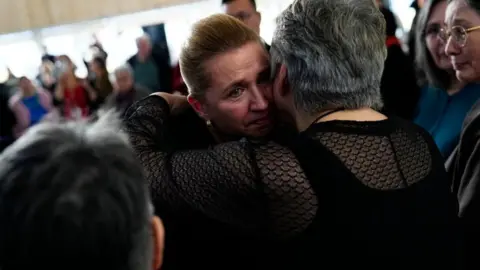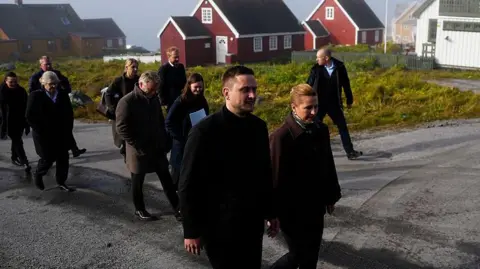
 EPA/Shutterstock
EPA/ShutterstockDozens of women in Greenland have heard Denmark's prime minister, Mette Frederiksen, formally apologise for a scandal that involved thousands of Inuit women being given contraceptive coils, as part of a controversial birth control programme during the 1960s and 70s.
"Dear women. Dear families. Dear Greenland. Today there is only one right thing to say to you. Sorry," Frederiksen told a packed venue in the centre of the capital Nuuk.
During an emotionally charged event, one women stood with her back to the prime minster in protest, a black handprint painted across her mouth.
"Sorry for the injustice that was committed against you," Frederiksen said. "Because you were Greenlanders. Sorry for what was taken from you. And for the pain it caused," she continued. "On behalf of Denmark. Sorry."
Naja Lyberth, who was one of the first of the Inuit Greenlanders to speak out about what happened, received a standing ovation as she addressed Wednesday's event.
"If we are to move forward, the apology is crucial," she said.
 MADS CLAUS RASMUSSEN/EPA/Shutterstock
MADS CLAUS RASMUSSEN/EPA/ShutterstockAn official inquiry earlier this month concluded that at least 4,000 women had a coil implanted by 1970, corresponding to roughly half the Greenlandic females of childbearing age.
In more than 300 cases examined by the inquiry, women and girls as young as 12 had been fitted with an IUD without their knowledge or consent.
Welcoming Frederiksen's apology and the investigation, Naja Lyberth was also critical that it had not explored possible human rights violations.
Frederiksen acknowledged that many women had lived with trauma and physical complications, and that some were not able to have children.
Among the women named by the prime minister in her speech was Elisa Christensen, who listened to the leader's words carefully and found her apology "very overwhelming".
Although she said she was still taking it in, she told the BBC: "There was no mention of compensation at all we are sad about that. It was almost like empty words."
Ahead of Wednesday's apology, Mette Frederiksen issued a statement outlining plans to establish a "reconciliation fund", but it is not yet clear how many women this would be offered to, or when this would happen.
It also suggested there would be payouts to other Greenlanders who had been "subjected to failure and systematic discrimination", but gave no further details.
A lawsuit demanding compensation has been filed by a group of 143 women.
Among them is Aviaq Petersen who was 24 when, during a routine medical appointment, a gynaecologist told her she had an IUD.
Now 59, Petersen believes the device was inserted without her knowledge, during an abortion 10 years earlier.
Doctors later found scarring on her fallopian tubes, and despite operations she has not been able to have children.
She has been sceptical about the timing of the Danish apology, but hopes to see a formal reconciliation process get under way.
"You were not asked. You had no opportunity to speak out. You were not heard. You were not seen," said Greenland's Prime Minister Jens-Frederik Nielsen, adding it was one of the darkest chapters in the country's history.
Greenland was a Danish colony until 1953, and then became a county of Denmark, before gaining home rule in 1979. However Copenhagen oversaw the healthcare system until 1992, when Greenland took over responsibility.
 AFP via Getty Images
AFP via Getty ImagesFrederiksen's apology comes amid increased scrutiny of Denmark's relationship with Greenland, and growing international pressure, particularly following President Donald Trump's repeated demands to take control of the Arctic territory.
The IUD case is one of several historic and current controversies including forced adoptions that have damaged Danish-Greenlandic relations.
Most recently another flashpoint has involved the removal of Inuit children from their families following "parenting competence" tests.
This week, a decision by Danish authorities to separate a young Greenlandic mother from her newborn daughter - one hour after she gave birth - was reversed after the case prompted outrage.
For Elisa Christensen, Denmark's official apology has brought a rollercoaster of emotions. "The little girl inside me, for the first time she felt she got a little hug from society.
"But for the grown up Elisa, I don't know [how] I use that apology. Where are the children and grandchildren I should I have?"

13 PerFlyer